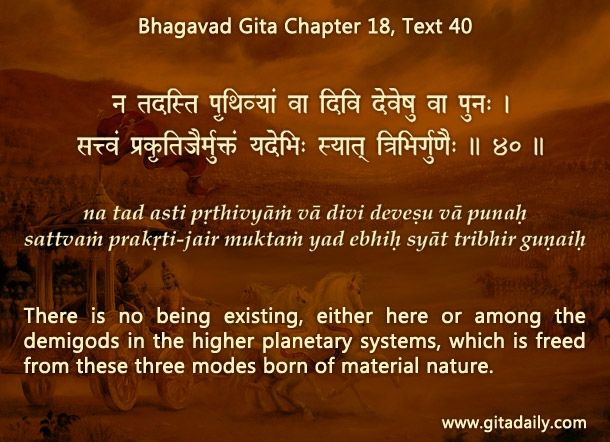When we hear of an epidemic spread all over the world, we feel impelled to urgently enquire how to protect ourselves. Similar is the rationale underlying the Bhagavad-gita’s (18.40) declaration that the influence of the three modes extends all over the universe – no one, not even the gods, are exempted.
The influence of the modes is like an infection; it triggers unnatural and misery-producing desires within us. The modes induce in us desires for temporary material things, desires unnatural for us as eternal spiritual beings. Such desires are also misery-producing; they bring misery when we lose the desired material things, as we will, sooner or later, for everything material is temporary.
The Gita analyzes how the modes infect all our actions (18.20-39), then it (18.40) stresses the ubiquity of the infection, thus driving home its immediacy. The infection’s not just somewhere out there, like an epidemic in a faraway place; it’s right here, all around us and even inside us.
Understanding that we are already infected revises our vision of our material attachments. We no longer see them as small problems that we can get rid of whenever we want in future, just by exerting a little more willpower. We see them instead as symptoms of a serious infection, an infection that will only worsen unless treated properly and promptly.
Yoga is the authorized therapeutic process. The Gita offers karma-yoga (18.41-48) and jnana-yoga (18.49-54) as progressive processes that culminate in bhakti-yoga (18.54-55). And then it (18.56) asserts the universality of bhakti-yoga – it is a panacea that can heal all people, whatever their level of infection.
Gita wisdom thus conveys both the gravity of the modes’ infection and the glory of the bhakti treatment. By this two-pronged analytical thrust, it impels us to embrace bhakti as an urgent soul-saver.

Explanation of article:
Podcast

Leave A Comment